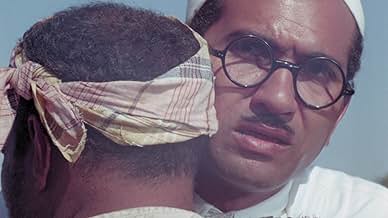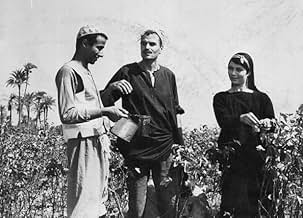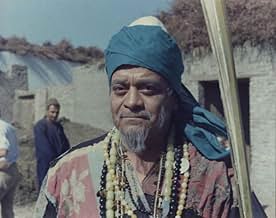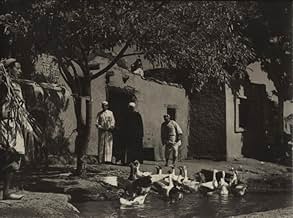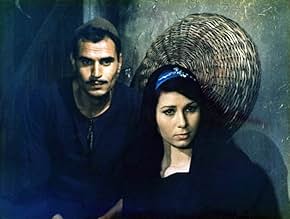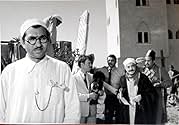IMDb RATING
8.0/10
2.7K
YOUR RATING
A small peasant village's struggles against the careless inroads of the large local landowner. The Land shows why political oppression does not necessarily lead to a sense of solidarity amon... Read allA small peasant village's struggles against the careless inroads of the large local landowner. The Land shows why political oppression does not necessarily lead to a sense of solidarity among the disinherited.A small peasant village's struggles against the careless inroads of the large local landowner. The Land shows why political oppression does not necessarily lead to a sense of solidarity among the disinherited.
- Director
- Writers
- Stars
- Awards
- 1 nomination total
Mahmoud El Meligy
- Muhammad Abu Swelim
- (as Mahmoud El-Meliguy)
Ali El Sherif
- Diab
- (as Ali El Scherif)
Tawfik El Deken
- Khedr
- (as Tewfik El Dekn)
- Director
- Writers
- All cast & crew
- Production, box office & more at IMDbPro
Featured reviews
The Revolt of the Waters
During the dictatorship of King Fuad, in Egypt, who reduced the powers of parliament and ruled in almost absolute power, with military support from the British, a group of peasants is dragged into a conflict with a high government official who intends to occupy their land to build a road to his new palace.
This is the story of a revolt by a handful of peasants, destined for defeat, and how some defended their land to the death, while others made a pact with corrupt power.
This is a universal story of power, corruption, character and popular resistance. A beautiful film.
This is the story of a revolt by a handful of peasants, destined for defeat, and how some defended their land to the death, while others made a pact with corrupt power.
This is a universal story of power, corruption, character and popular resistance. A beautiful film.
"Either you keep your mouths shut or you die."
"I'd rather die."
They're very different films, but perhaps this would fit in a trilogy about the struggle for water resources, alongside Chinatown (1974), and Dry Summer (1964). There is a larger story here too, one that's specific to a time and place, 1930's Egypt, but also universal and timeless. Does anything symbolize the rich taking wealth away from the masses so directly than the bey in this story diverting water to his own fields, or him subverting the will of the people by building a road over their land for his own personal benefit rather than pushing for more water for the peasants? We also see how a local religious figure plays a role in wielding power over the people and maintaining the status quo. "God help us," he intones repeatedly during one crisis, when it's clear that it's only the people who can help themselves.
What makes the plight of the fellahin (peasant farmers) particularly humiliating is that some of them fought in the 1919 Egyptian Revolution (the one played by Mahmoud el-Meliguy in particular), and yet now continue to be oppressed. The disillusionment is palpable, and el-Meliguy is fantastic here. Such solidarity is required to have any hope of fighting the power in all of its various layers, e.g. The effendi, mayor, bey, prime minister, king, and the English, whose presence is still felt, but we see how hard that is, as naturally the poor begin squabbling amongst themselves out of desperation. It's one telling moment all the villagers all come together to get a cow out of a well, a model of cooperation, and in another, a man sells out the villagers in order to have the road be diverted around his own land. We also see one woman who feels forced to sell her affections for produce, e.g. For two cucumbers, come to a grisly end.
The story is a little rough around the edges relative to the heroine (Nagwa Ibrahim), as initially we see her trying to seduce a pre-pubescent boy because he's the son of a wealthy man and might offer a possible escape out of life in the country, but then shift to a farmer (Ezzat El Alaili) who has been pushing hard for her hand without a lot of insight into her motivations, other than seeing he wants to protect her. The boy and the father who was teaching him poetry abruptly disappear, but perhaps they provided their narrative purpose, illustrating the class difference and how the pocket money the father gives him is quite a sum compared to those struggling to pay food debts. Similarly, we hear student protesters chanting "Down with colonialism," probably representing the 1935-36 protests, but it's notable that they're not shown and seem completely disconnected from the struggles of the peasants on the land.
Certainly a meaningful story, one told very well by Chahine and including some beautiful images, but a little depressing.
They're very different films, but perhaps this would fit in a trilogy about the struggle for water resources, alongside Chinatown (1974), and Dry Summer (1964). There is a larger story here too, one that's specific to a time and place, 1930's Egypt, but also universal and timeless. Does anything symbolize the rich taking wealth away from the masses so directly than the bey in this story diverting water to his own fields, or him subverting the will of the people by building a road over their land for his own personal benefit rather than pushing for more water for the peasants? We also see how a local religious figure plays a role in wielding power over the people and maintaining the status quo. "God help us," he intones repeatedly during one crisis, when it's clear that it's only the people who can help themselves.
What makes the plight of the fellahin (peasant farmers) particularly humiliating is that some of them fought in the 1919 Egyptian Revolution (the one played by Mahmoud el-Meliguy in particular), and yet now continue to be oppressed. The disillusionment is palpable, and el-Meliguy is fantastic here. Such solidarity is required to have any hope of fighting the power in all of its various layers, e.g. The effendi, mayor, bey, prime minister, king, and the English, whose presence is still felt, but we see how hard that is, as naturally the poor begin squabbling amongst themselves out of desperation. It's one telling moment all the villagers all come together to get a cow out of a well, a model of cooperation, and in another, a man sells out the villagers in order to have the road be diverted around his own land. We also see one woman who feels forced to sell her affections for produce, e.g. For two cucumbers, come to a grisly end.
The story is a little rough around the edges relative to the heroine (Nagwa Ibrahim), as initially we see her trying to seduce a pre-pubescent boy because he's the son of a wealthy man and might offer a possible escape out of life in the country, but then shift to a farmer (Ezzat El Alaili) who has been pushing hard for her hand without a lot of insight into her motivations, other than seeing he wants to protect her. The boy and the father who was teaching him poetry abruptly disappear, but perhaps they provided their narrative purpose, illustrating the class difference and how the pocket money the father gives him is quite a sum compared to those struggling to pay food debts. Similarly, we hear student protesters chanting "Down with colonialism," probably representing the 1935-36 protests, but it's notable that they're not shown and seem completely disconnected from the struggles of the peasants on the land.
Certainly a meaningful story, one told very well by Chahine and including some beautiful images, but a little depressing.
10lodioct
Perhaps this is the best Egyptian movie of all time , and before chahine started to write his own script from where it all went down hill.the acting is superb specially Elmelliguy and Yehia Chahine, they are very believable but all thanks to the original novel.a recommended movie for all.
One of the greatest Egyptian movies . I loved the music working along side with brilliant cinematography which included a brand new locations chosen professionally from the Egyptian countryside. The ending is just completion of such a brilliant and professional picture.
As IMDb states, "The Land" tells the story of A small peasant village's struggles against the careless inroads of the large local landowner.
Not only are the performances authentic, and shockingly realistic, but the filmmaker, Youssef Chahine was able to take a very simplistic story on his root, and turn it into an immensely complex and nuanced social drama.
This is possibly the best film ever made in Africa, if you choose to give that film 2h10 of your time, you will never regret it.
This is possibly the best film ever made in Africa, if you choose to give that film 2h10 of your time, you will never regret it.
Did you know
- TriviaThis movie has been Ranked among the top 10 movies in the history of Egyptian cinema.
- How long is The Land?Powered by Alexa
Details
- Release date
- Country of origin
- Language
- Also known as
- The Land
- Filming locations
- See more company credits at IMDbPro
Contribute to this page
Suggest an edit or add missing content


